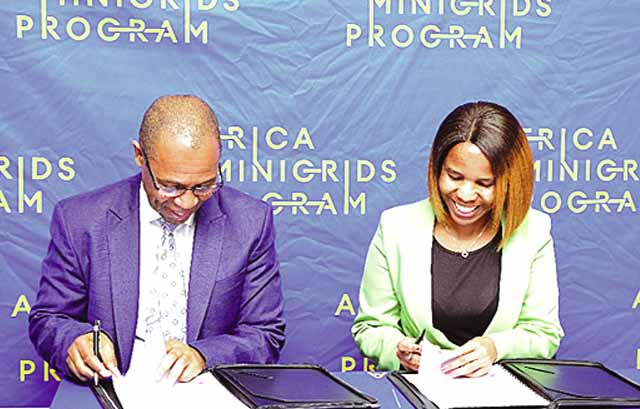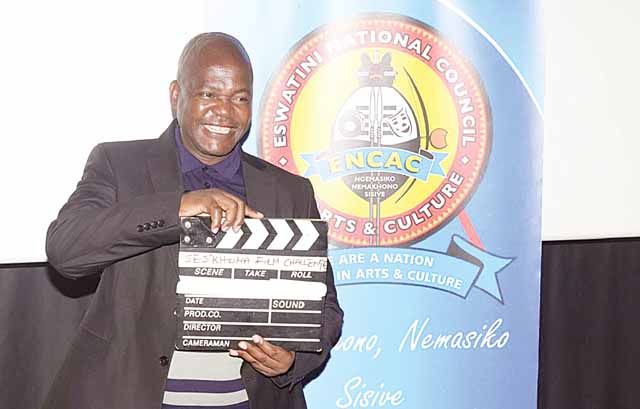By Nomfanelo Maziya | 2023-11-29

The country’s energy industry is promoting and undertaking green initiatives that align with the set United Nations Sustainable Development Goals (SDGs) for clean energy.
One of the initiatives is the Africa Mini-grids Programme (AMP), which is a country-led technical assistance programme with the objective of supporting access to clean energy by increasing the financial viability and promoting scale-up commercial investment in renewable energy mini-grids in Africa with a focus on cost-reduction levers and innovative business models.
The programme which is supported by the Global Environment Fund (GEF), led by the United Nations Development Programme (UNDP) in partnership with Rocky Mountain Institute (RMI), is being implemented in Eswatini by the Eswatini Energy Regulatory Authority (ESERA) as mandated by the ministrywhich is its implementing partner.
COP 27 Clean Energy Resolution
The AMP was launched on November 15, 2022 at the UNFCCC COP 27, which was held in Egypt to rapidly and cost-effectively provide electricity and new development opportunities in an initial 21 African countries in alignment with the UN Sustainable Development Goals 7 and 13 aimed at ensuring access to affordable, reliable, sustainable and modern energy for all and increasing the share of renewable energy in the Global Energy Mix.
AMP Eswatini Progress
Presently, there is an already operational mini-grid, providing electricity to the remote community of Mvundla in the outlying areas of Manzini, whilst progress is being made towards the development of a second mini-grid pilot in the remote community of Bulimeni in the same region.
The existing mini-grid was constructed by EEC and co-financed into the AMP project. With the Mvundla mini-grid, the project thereby seeks to demonstrate increased economic viability/feasibility and attractiveness of the existing mini-grid as well as an increased developmental impact for the community based on productive use support.
The project is being rolled out in three components, which included; policy and regulation, business innovation and private sector involvement as well as digital knowledge management and monitoring which are all being implemented through a multi-stakeholder approach.
This included strategic partnerships with stakeholders that were key to the project through various Memorandum of Understanding. To date, ESERA has signed cooperation agreements with three stakeholders so as to ensure the efficient implementation of the project through a robust and inclusive approach.
These included the Small Enterprises Development Company (SEDCO), which would conduct business development support for small businesses, and facilitate stakeholder engagement, market research and data collection in the project area.
The Renewable Energy Association of Eswatini (REASWA) on the other hand would offer capacity building and awareness raising on AMP activities and will help forge further partnerships and networks for AMP under the project.
In addition, the University of Eswatini (UNESWA) through the Centre for Sustainable Energy Research will develop and offer short courses related to clean energy mini-grids to strengthen the capacity of potential developers and operators to consider design parameters, innovative business models and cost-reduction levers, to improve project feasibility.
Speaking at the signing ceremony of the Memorandum of Understanding in Mbabane which was held in October, ESERA CEO Sikhumbuzo Tsabedze said he was optimistic that the AMP Eswatini would foster a conducive environment for mini-grid existence and significantly contribute to the reduction of green house gas emissions in the country.
Speaking on the sidelines of the same event, UNESWA Vice-Chancellor, Professor Justice Thwala said the partnership with ESERA would help foster an environment that promoted innovative thinking at a time when the country is taking bold steps towards promoting a sustainable future.
The AMP aligns with the country’s targets for renewable energy and expectations that mini-grids will contribute to the achievement of universal energy access as set out by the National Energy Policy (2018) and the Kingdom of Eswatini Masterplan 2034.
As momentum rises for the upcoming United Nations Climate Conference (UNFCCC) COP28 to be held in the United Arab Emirates between November 30 and December 12, members of the COP were polishing up preparations for the landmark event where progress will be reviewed on the implementation of the set universal climate targets.
This will also include a review amongst other topics of the progress made on the AMP which was launched at COP 27 in Egypt.
share story
Post Your Comments Below
Every year, the global community comes together for 16 Days of Activism against gender-based viol...

THIS year, Eswatini’s Global Entrepreneurship Week (GEW) is shining a light on its dynamic ...
Employees of the University of Eswatini (UNESWA) have likened Vice Chancellor Professor Justice T...
NATIONAL Disaster Management Agency (NDMA) Chief Executive Officer Victor Mahlalela has called fo...
All material © Swazi Observer. Material may not be published or reproduced in any form without prior written permission.
Design by Real Image Internet